
An alcopop is any of certain mixed alcoholic beverages with relatively low alcohol content, including:
- Malt beverages to which various fruit juices or other flavorings have been added
- Wine coolers: beverages containing wine to which ingredients such as fruit juice or other flavorings have been added
- Mixed drinks containing distilled alcohol and sweet liquids such as fruit juices or other flavourings

Franchising is based on a marketing concept which can be adopted by an organization as a strategy for business expansion. Where implemented, a franchisor licenses some or all of its know-how, procedures, intellectual property, use of its business model, brand, and rights to sell its branded products and services to a franchisee. In return, the franchisee pays certain fees and agrees to comply with certain obligations, typically set out in a franchise agreement.

A soft drink is any water-based flavored drink, usually but not necessarily carbonated, and typically including added sweetener. Flavors used can be natural or artificial. The sweetener may be a sugar, high-fructose corn syrup, fruit juice, a sugar substitute, or some combination of these. Soft drinks may also contain caffeine, colorings, preservatives and other ingredients.

Whisky or whiskey is a type of liquor made from fermented grain mash. Various grains are used for different varieties, including barley, corn, rye, and wheat. Whisky is typically aged in wooden casks, which are typically made of charred white oak. Uncharred white oak casks previously used for the aging of port, rum or sherry are also sometimes used.

Bourbon is a type of barrel-aged American whiskey made primarily from corn (maize). The name derives from the French Bourbon dynasty, although the precise source of inspiration is uncertain; contenders include Bourbon County in Kentucky and Bourbon Street in New Orleans, both of which are named after the dynasty. The name bourbon may not have been used until the 1850s; the association with Bourbon County did not appear until the 1870s.

The Alcohol and Tobacco Tax and Trade Bureau, statutorily named the Tax and Trade Bureau and frequently shortened to TTB, is a bureau of the United States Department of the Treasury, which regulates and collects taxes on trade and imports of alcohol, tobacco, and firearms within the United States.
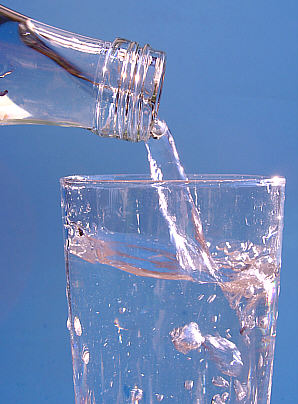
Bottled water is drinking water packaged in plastic or glass water bottles. Bottled water may be carbonated or not. Sizes range from small single serving bottles to large carboys for water coolers.

The Coca-Cola Company is an American multinational corporation founded in 1892. It produces Coca-Cola. The drink industry company also manufactures, sells, and markets other non-alcoholic beverage concentrates and syrups, and alcoholic beverages. The company's stock is listed on the NYSE and is part of the DJIA and the S&P 500 and S&P 100 indexes.

PepsiCo, Inc. is an American multinational food, snack, and beverage corporation headquartered in Harrison, New York, in the hamlet of Purchase. PepsiCo's business encompasses all aspects of the food and beverage market. It oversees the manufacturing, distribution, and marketing of its products. PepsiCo was formed in 1965 with the merger of the Pepsi-Cola Company and Frito-Lay, Inc., PepsiCo has since expanded from its namesake product Pepsi Cola to an immensely diversified range of food and beverage brands. The largest and most recent acquisition was Pioneer Foods in 2020 for US$1.7 billion and prior to it was buying the Quaker Oats Company in 2001, which added the Gatorade brand to the Pepsi portfolio and Tropicana Products in 1998.

Container-deposit legislation is any law that requires the collection of a monetary deposit on beverage containers at the point of sale and/or the payment of refund value to the consumers. When the container is returned to an authorized redemption center, or retailer in some jurisdictions, the deposit is partly or fully refunded to the redeemer. It is a deposit-refund system.

A reverse vending machine (RVM) is a machine that allows a person to insert a used or empty glass bottle, plastic bottle, or aluminum can in exchange for a reward. After inserting the recyclable item, it is then compacted, sorted, and analyzed according to the number of ounces, materials, and brand using the universal product code on the bottle or can. Once the item has been scanned and approved, it is then crushed and sorted into the proper storage space for the classified material. Upon processing the item, the machine rewards people with incentives, such as cash or coupons.

Alcohol advertising is the promotion of alcoholic beverages by alcohol producers through a variety of media. Along with nicotine advertising, alcohol advertising is one of the most highly regulated forms of marketing. Some or all forms of alcohol advertising are banned in some countries. There have been some important studies about alcohol advertising published, such as J.P. Nelson's in 2000.

American whiskey is whiskey produced in the United States. American whiskeys made from mashes with at least 51% of their named grains include bourbon whiskey, rye whiskey, rye malt whiskey, malt whiskey, wheat whiskey, Tennessee whiskey, and corn whiskey.
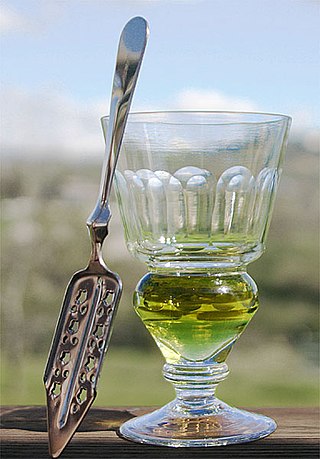
Absinthe is an anise-flavored spirit derived from several plants, including the flowers and leaves of Artemisia absinthium, together with green anise, sweet fennel, and other medicinal and culinary herbs. Historically described as a highly alcoholic spirit, it is 45–74% ABV or 90–148 proof in the US. Absinthe traditionally has a natural green color but may also be colorless. It is commonly referred to in historical literature as la fée verte. While sometimes casually referred to as a liqueur, absinthe is not traditionally bottled with sugar or sweeteners. Absinthe is traditionally bottled at a high level of alcohol by volume, but it is normally diluted with water before being consumed.

As of 2006 most distilled spirits labelled as "whisky" in India were a form of Indian-made foreign liquor, commonly blends based on neutral spirits that are distilled from fermented molasses with only a small portion consisting of traditional malt whisky, usually about 10 to 12 percent. Outside India, such a drink would more likely be labelled a rum. According to the Scotch Whisky Association's 2013 annual report, unlike in the European Union (EU), "there is no compulsory definition of whisky in India, and the Indian voluntary standard does not require whisky to be distilled from cereals or to be matured. Very little Indian 'whisky' qualifies as whisky in the EU owing to the use of molasses or neutral alcohol, limited maturation and the use of flavourings. Such spirits are, of course, considerably cheaper to produce than genuine whisky." Such molasses-based blends made up 90 percent of the spirits consumed as "whisky" in India in 2004, although whisky wholly distilled from malt and other grains, was also manufactured and sold. By 2004 shortages of wheat had been overcome and India was one of the largest producers. Amrut, the first single malt whisky produced in India, was launched in Glasgow, Scotland in 2004. After expanding in Europe it was launched in India in 2010.
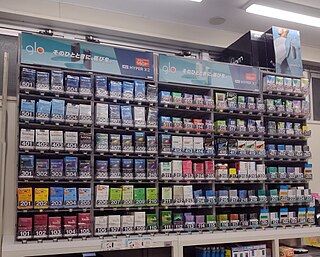
Smoking in Japan is practiced by around 20,000,000 people, and the nation is one of the world's largest tobacco markets, though tobacco use has been declining in recent years.

There are ten states in the United States of America with container deposit legislation, popularly called "bottle bills" after the Oregon Bottle Bill, the first such legislation that was passed.
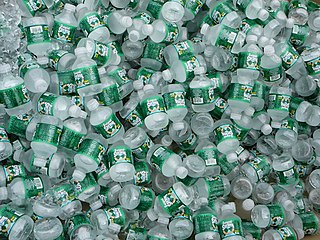
The United States is the largest consumer market for bottled water in the world, followed by Mexico, China, and Brazil.
Bottled water bans have been proposed and enacted in several municipalities and campuses everywhere over such concerns as resource wastage, transportation emissions, plastic litter, and damage to affected aquifers.
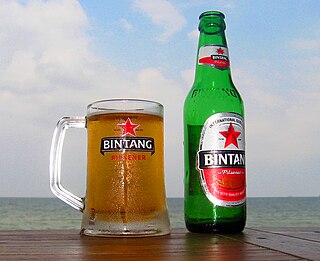
Alcohol in Indonesia refers to the alcohol industry, alcohol consumption and laws related to alcohol in the South East Asian country of Indonesia. Indonesia is a Muslim majority country, yet it is also a pluralist, democratic and secular nation. These social and demographic conditions led to Islamic parties and pressure groups pushing the government to restrict alcohol consumption and trade, while the government carefully considers the rights of non-Muslims and consenting adults to consume alcohol, and estimates the possible alcohol ban effects on Indonesian tourism and the economy.



















